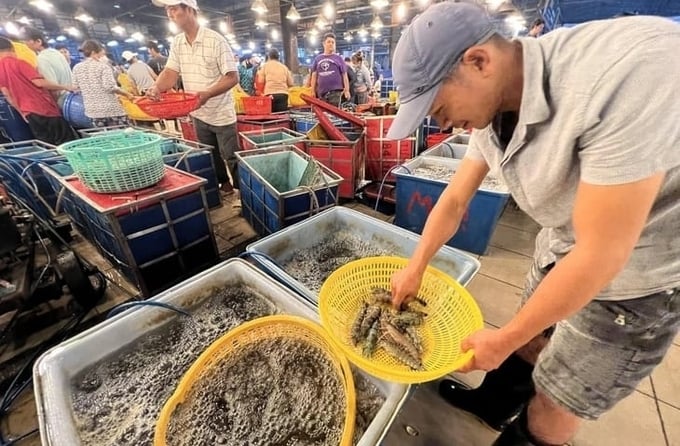November 24, 2025 | 07:22 GMT +7
November 24, 2025 | 07:22 GMT +7
Hotline: 0913.378.918
November 24, 2025 | 07:22 GMT +7
Hotline: 0913.378.918

Vietnamese shrimp exports are popular in Japan.
According to VASEP, shrimp exports to Japan reached US$ 37 million in January 2024, an increase of 30% over the same period in 2023. Including the first two months of 2024, Japan is Vietnam's third-largest shrimp import market, after the US and China.
Japan accounts for 15.4% of Vietnam's shrimp export output and will continue to increase shortly.
The bright prospects of Vietnamese shrimp are also shown in the fact that products processed from shrimp, such as breaded shrimp, stretched shrimp, fried shrimp, sushi shrimp, etc., continue to maintain a competitive advantage in Japan.
Japanese people favored Indian shrimp and Ecuadorian shrimp due to their cheap prices. Mr. Vo Van Phung, director of Vietnam Clean Seafood Joint Stock Company, explained that if buying processed products sold in supermarkets and ready to eat, this market chooses Vietnamese shrimp.
Another leader in the shrimp industry added that Japanese people are complicated. They can accept choosing delicious and expensive shrimp over cheap shrimp, including young people.
Japan is the third-largest seafood consumption market in the world. Demand for many of Vietnam's strong products, including shrimp, is always high.
In the US and EU, pre-processed shrimp from India and Ecuador (including heads) with low prices are taking advantage. However, this is no longer true for Japan in 2024; the market is forecast to recover sooner than other countries.
Compared to the US and EU, Vietnamese shrimp reduces logistics and preservation costs when exported to Japan. The payment method is also safer, avoiding the crisis of double transportation costs due to conflicts in the Red Sea.
VASEP predicts that many seafood enterprises will increase exports to Japan in 2024, especially shrimp products.
The value of shrimp exports to Japan this year reached US$ 511 million, down 24% compared to 2022. Vietnam's shrimp exports are forecast to recover and increase slightly from 10% to 15% in 2024. Export turnover is expected to reach US$ 4 billion.
Another reason Vietnamese shrimp increased its market share in Japan is Yen's strong appreciation from the end of 2023.
A VASEP exchange rate expert cited that in 2023, the Yen depreciated sharply due to high inflation in Japan, causing the number of orders from this market to almost stand still.
The Yen has increased to its highest level in 5 weeks, fluctuating around 150 JPY/US$. The Bank of Japan supports raising interest rates and predicts that the Yen exchange rate in the next few weeks could touch 145 JPY/US$.
Translated by Tuan Huy
/2025/11/21/4309-2-153400_128.jpg)
(VAN) Green and low-emission rice is paving the way for Vietnamese rice to enter high-end markets, marking the beginning of a transformation journey toward greening and elevating the national rice brand.

(VAN) ‘Right to Win’ outlines a national action plan that shapes a new vision for Viet Nam’s agriculture in an era of renewal and global integration.

(VAN) Lam Dong’s farmed sturgeon output this year is expected to reach 2,300 tons, worth VND 450 billion, affirming the brand’s position on the market.

(VAN) A surge in Ukrainian egg exports, largely driven by soaring sales to the UK over the last few years, has notably pushed up egg prices on the domestic market.

(VAN) The price of Arabica Catimor coffee in Quang Tri is currently at VND 25,000–27,000/kg (fresh cherries), the highest level ever recorded

(VAN) 'From the coffee story, we can think deeper and further about the crop production sector - from development orientations and value-chain organization to international integration,' assessed Dr Le Quoc Doanh.
/2025/11/18/2431-0-161627_248.jpg)
(VAN) Viet Nam accounts for 43% of the world's export volume of Robusta coffee. However, the Vietnamese Robusta coffee brand has yet to gain broad recognition on the global market.